
Prince and the Pauper
Versandkostenfrei!
Versandfertig in 1-2 Wochen
15,99 €
inkl. MwSt.
Weitere Ausgaben:

PAYBACK Punkte
8 °P sammeln!
Tom Canty, youngest son of a poor family living with the dregs of society in Offal Court, has always aspired to a better life. Loitering around the palace gates one day, he sees the Prince of Wales -Edward VI. Tom is nearly caught and beaten by the Royal Guards; however, Edward stops them and invites Tom into his palace chamber. There the two boys get to know one another, fascinated by each other's life and their uncanny resemblance. They decide to switch clothes "temporarily". Edward leaves in a hurry before the boys are caught at their game, snatching up the Great Seal of England. Soon Princ...
Tom Canty, youngest son of a poor family living with the dregs of society in Offal Court, has always aspired to a better life. Loitering around the palace gates one day, he sees the Prince of Wales -Edward VI. Tom is nearly caught and beaten by the Royal Guards; however, Edward stops them and invites Tom into his palace chamber. There the two boys get to know one another, fascinated by each other's life and their uncanny resemblance. They decide to switch clothes "temporarily". Edward leaves in a hurry before the boys are caught at their game, snatching up the Great Seal of England. Soon Prince Edward is trying to escape the brutality of Tom's abusive drunken father. Tom, posing as the prince, tries to cope with court customs and manners.....













